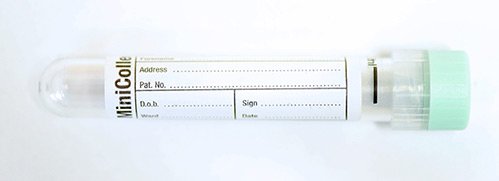7-dehydrocholesterol (7-DHC)
Chemical Pathology
Notes
7-dehydrocholesterol is used in the diagnosis of Smith-Lemli-Opitz syndrome. Blood and tissue of infants with Smith- Lemli-Opitz (SLO) syndrome contain reduced amounts of cholesterol and greatly increased concentrations of 7-dehydrocholesterol and of its isomer 8-dehydrocholesterol.
Features of this disease can include learning and behavioural problems. Physical abnormalities can be of varying severity; patients may have distinctive facial features, microcephaly, growth retardation, hypotonia, limb abnormalities, feeding difficulties and malformations of the heart, lungs, kidneys, gastrointestinal tract and genitalia.
Sample requirements
For adults, blood taken into a 5mL gold top gel tube (or rust top for the Acute Unit) and protected from light

For children, blood taken into a 3.5mL rust top tube and protected from light

For neonates, blood taken into a 0.8ml minicollect lithium heparin tube and protected from light

Storage/transport
- Do not store. Send at ambient temperature to the laboratory on same day as sample collection.
- 7-DHC is photosensitive, so blood samples must be protected from the light - wrap in foil or brown paper immediately after collection/labeling.
Required information
Relevant clinical details, including details of clinical presentation.
Turnaround times
Samples are referred to North Bristol NHS Trust for analysis, with a result expected within six weeks.
Reference ranges
Plasma 7-dehydrocholesterol: < 2.5 µmol/L
Further information
To learn more about 7-dehydrocholesterol visit http://ghr.nlm.nih.gov/condition/smith-lemli-opitz-syndrome
Page last updated 25/04/2023